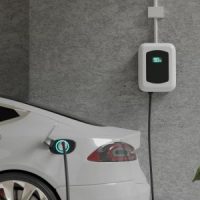Condominium Associations & Electric Vehicles

The International Energy Agency reports that in 2023, one of every five vehicles sold worldwide was electric. This change is slowly being reflected in the United States, and with more electric vehicles (EVs) comes the need for more EV chargers. Florida’s legislature sees this as a positive, and has amended laws for residents in single family homes and HOAs to make EV use easier. However, condominium associations may require some modifications to their governing documents before changes like these can be made in their communities.
Owners May Install Their Own EV Chargers
Florida’s legislature has explicitly come out in favor of EV use, stating in the relevant part of the state Condominium Act that it “conserves and protects” the state’s natural resources, serving an “important public interest.” As a result, the law is worded in a way quite favorable to EV owners and users. For example, if a declaration of condominium or restrictive covenant seeks to prohibit EV chargers from being installed in owners’ parking spaces (usually considered common elements), the law supersedes that regulation and allows the charger’s installation.
There are certain rules that a condo association can insist upon before the EV charger is installed – for example, the law states that the charger may not cause “irreparable damage” to the condo property, and the electricity used in the charger must be paid for by the unit owner. The owner must also foot the bill for its installation, maintenance, and/or removal and abide by all prevailing safety standards – but if these rules are obeyed, the association cannot forbid the charger’s installation.
Associations May Require Outside Assistance
While unit owners may install their own EV chargers in their own parking spots as long as the statutory requirements are met, associations may also choose to install chargers for the use of others. However, depending on the specific context of each condominium association and the provisions of its governing documents, their installation may require an owner vote or other agreements before anything may proceed.
By far the biggest bone of contention if an association chooses to install EV chargers is the cost. While every unit owner shares the cost of a material alteration to association property, the exact specifics must be tailored to the specific situation, and any required assessments must be enforced indiscriminately. It is strongly recommended to seek legal help before going ahead with a vote.
Contact A Tampa Condominium Association Attorney
EVs are slowly becoming more and more prevalent on Florida’s roads, but the infrastructure to support them is not necessarily there yet. If your condo association is interested in installing EV chargers, contacting a Tampa condo association attorney from the Seward Law Office may help to clarify your options. Attorney Alicia Seward has handled these types of cases before, and will work hard to get you a satisfactory resolution. Call our office today to schedule a consultation.
Source:
iea.org/reports/global-ev-outlook-2024/trends-in-electric-cars
